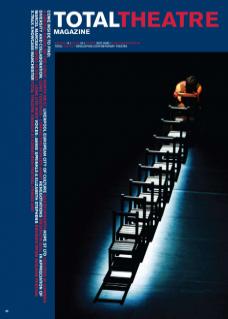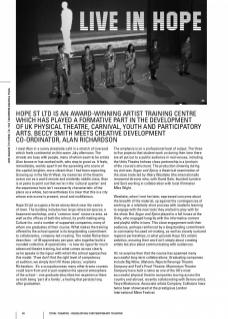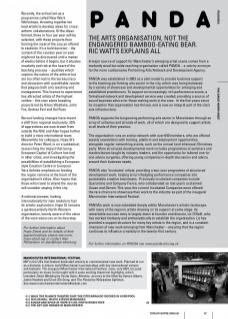I meet Alan in a sunny streetside café in a stretch of Liverpool which feels continental on this warm July afternoon. The streets are busy with people, many of whom seem to be artists Alan knows or has worked with, who stop to greet us. It feels, immediately, worlds apart from the sprawling arts scene of the capital; brighter, more vibrant than I had been expecting. Growing up in the North West, my memories of the theatre scene are as a world remote and stridently middle class. Alan is at pains to point out that we’re in the ‘cultural quarter’ and the experience here isn’t necessarily characteristic of the place as a whole, but nevertheless it is clear that this is a city whose arts scene is present, vocal and multifarious.
Hope St Ltd occupies a three-storey block near the centre of town. The building includes two large rehearsal spaces, a basement workshop, and a ‘common room’ resource area, as well as the offices of both the school, its profit-making wing Culture Inc. and a number of supported companies, many of whom are graduates of their course. What makes the training offered by the school special is its longstanding commitment to collaborative, company-led creating. The model Richardson describes – of 20 apprentices per year, who together build a rounded collective of specialisms – is now de rigeur for much advanced theatre training, but what comes across clearly as he speaks is the rigour with which the school approaches this model. ‘If we don’t find the right level of competency at audition, we simply don’t fill those places,’ explains Richardson. It’s a scrupulousness many other drama courses could learn from and in part explains the special atmosphere of the school – one graduate describes her experience there as both being ‘part of a family’, a feeling that persists long after graduation.
The emphasis is on a professional level of output. The three to five projects that student work on during their time there are all put out to a public audience in real venues, including the Unity Theatre (whose close partnership is a lynchpin of the course’s structure). The production showing during my visit was Sugar and Spice, a theatrical examination of the slave trade led by Hilary Westlake (the internationally renowned director who, with David Gale, founded Lumiere and Son) working in collaboration with local filmmaker Mike Wight.
Westlake, when I met her later, expressed concerns about the breadth of the material, up against the contingencies of working on a relatively short process with students learning to engage with the new tools they wished to play with for the show. But Sugar and Spice played to a full house at the Unity, who engaged hungrily with the informative content and playful shifts in tone. This close engagement with their audience, perhaps reinforced by a longstanding commitment to community-focused art-making, as well as closely nurtured regional partnerships, is what grounds Hope St’s artistic ambition, ensuring their work isn’t simply about creating artists but also about communicating with audiences.
It’s no surprise then that the course has spawned many successful long-term collaborations. Graduating companies include Big Wow, Ullaloom, Rejects Revenge Theatre Company and Fool’s Proof Theatre. Momentum Theatre Company have built a name as one of the UK’s most successful physical theatre companies touring across the country and abroad, recently collaborating with Derevo artist, Tanya Khabarova. Associate artists Company: Collisions have twice been showcased at the prestigious London International Mime Festival.
Recently, the school set up a programme called New Work Workshops, throwing together ten lead artists to develop ideas for crossartform collaborations. Of the ideas formed, three or four per year will be selected, with these projects then forming the meat of the course offered to students. It’s a bold decision – the content of the courses year on year might not be discovered until a matter of weeks before it begins, but it situates creativity and risk at the heart of the teaching process – qualities which capture the nature of the artform but are too often lost to the bureaucracy and obsession with quantifiable results that plagues both arts teaching and management. This licence to experiment has attracted artists of the highest calibre – this year alone boasting projects led by Hilary Westlake, John Fox, Andrea Earl and Kal Ross.
Recent funding changes have meant a shift from regional exclusivity. 25% of apprentices are now drawn from outside the NW, and Alan hopes further to build a more international team. Meanwhile his colleague, Hope St’s director Peter Ward, is on a sabbatical, researching the impact that being European Capital of Culture has had in other cities, and investigating the possibilities of establishing a European style Creation Centre in Liverpool. Yet a definite emphasis on feeding the region remains at the heart of the organisation’s ethos. Alan hopes that those who travel to attend the course will consider staying in the city. A national pioneer, looking internationally for new models to fuel its artistic exploration, Hope St remains a quintessentially North-Western organisation, keenly aware of the value of the vast resources on its doorstep.
MANCHESTER INTERNATIONAL FESTIVAL
MIF is the UK’s first festival dedicated entirely to commissioned new work. Planned to run as a biennial, it aims to build Manchester’s partnerships with key international venues and festivals. The inaugural Manchester International Festival, June–July 2007, focused particularly on music but brought with it some exciting theatrical highlights, which included: Dead Wedding by Faulty Optic; Monkey: Journey to the West by Damon Albarn, Jamie Hewlett and Chen Shi-Zeng; and The Pianist by Wdalyslaw Spillman. See www.manchesterinternationalfestival.com
For further information about Hope Street and for details of their apprenticeships, please see www. hope-street.org or contact Alan Richardson on alan@hope-street.org


